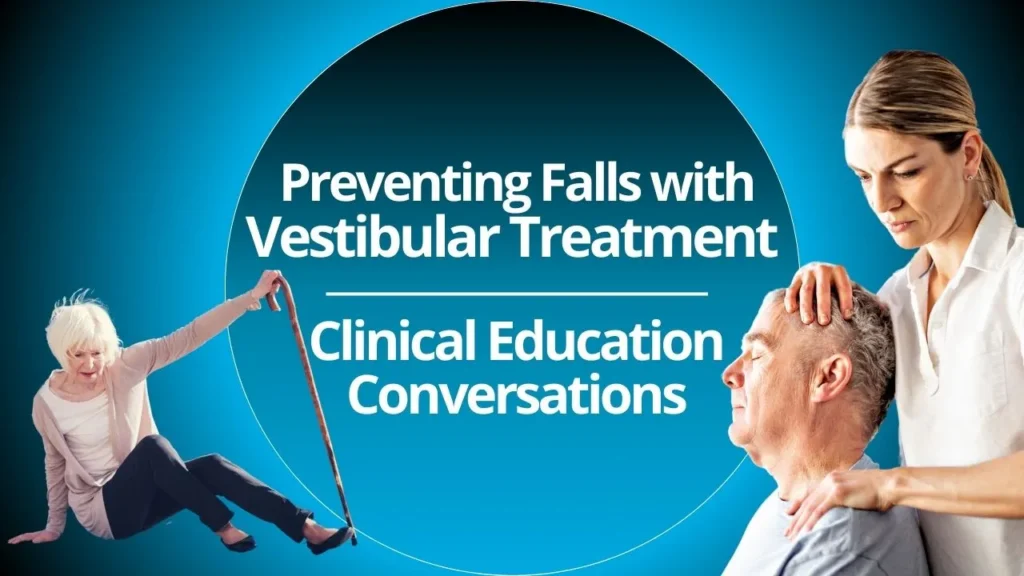
Falls among the elderly are not just accidents; they often indicate underlying health issues. In this blog we explore preventing falls with vestibular treatment.
Understanding how vestibular treatment can help with preventing falls is crucial. Such accidents can lead to significant injuries and affect individuals’ independence and quality of life.
Here, we explore how vestibular treatment and falls prevention are interlinked, offering a pathway to safer, healthier aging.
In a recent Clinical Conversations episode on YouTube, Caitlin Whiteley, Mark Martire, and Ashley Langford shared how balance screenings, enjoyable preventive exercises, and proactive community education can foster independence and improve the quality of life for the elderly.
Recognizing the Risks
Many people mistakenly accept dizziness and imbalance as normal parts of aging.
According to Caitlin Whiteley, a senior clinic manager and physical therapist at CORA Physical Therapy, these symptoms are often treatable. Vestibular therapy can significantly reduce the risk of falls, preventing severe injuries that could lead to loss of independence.
The Role of Vestibular Treatment in Preventing Falls
Vestibular issues can cause symptoms like dizziness, imbalance, and vertigo, which increase the risk of falling.
Mark Martire, a clinic manager and physical therapist at CORA Physical Therapy, advocates for proactive measures. He highlights the importance of regular balance screenings at community centers, which can identify risks early on.
These screenings often lead to simple, at-home exercises or more formal treatment in a clinic, depending on the individual’s needs.
Making Fall Prevention Accessible and Enjoyable
Ashley Langford, physical therapist and director at the CORA Institute for Clinical Excellence, points out that preventive exercises don’t have to be a chore.
Physical therapy can include enjoyable activities that integrate well into daily routines, whether it’s using a golf club for balance exercises or participating in water aerobics.
This approach not only enhances balance but also encourages consistent participation.
Community Outreach and Vestibular Treatment Education
Education is a cornerstone of effective fall prevention. Informing both the public and healthcare providers about the importance of vestibular treatment and balance screenings is essential.
Mark Martire notes the importance of educating primary care physicians who can refer patients for balance screenings, thus integrating falls prevention into regular health care.
Overcoming Barriers to Preventing Falls
One significant barrier to preventing falls is the fear among the elderly of losing independence.
Caitlin Whitley discusses how addressing vestibular and balance issues early can help maintain independence longer, alleviating fears about discussing these problems with family members or caregivers.
The Importance of Support Networks
It is critical for support networks, including family and caregivers, to encourage screenings and treatment.
Recognizing symptoms and advocating for elderly relatives can lead to early interventions, significantly reducing the risk of falls.
Looking Forward
As our population ages, the importance of falls prevention grows. Physical and occupational therapists are pivotal in providing screenings and treatments that can prevent falls.
Ashley Langford stresses the exciting advancements in therapy that make interventions more accessible and effective, signaling a shift towards more preventative care in the medical field.
Conclusion
Vestibular Rehabilitation Therapy and falls prevention are not just about avoiding accidents; they are about enhancing the quality of life for the elderly.
Through community education, enjoyable and accessible treatments, and the support of healthcare providers and families, we can significantly reduce the risk of falls. This holistic approach not only saves costs associated with fall-related injuries but also preserves the independence and dignity of our aging population.
Let’s embrace these strategies and ensure a safer, healthier future for all.